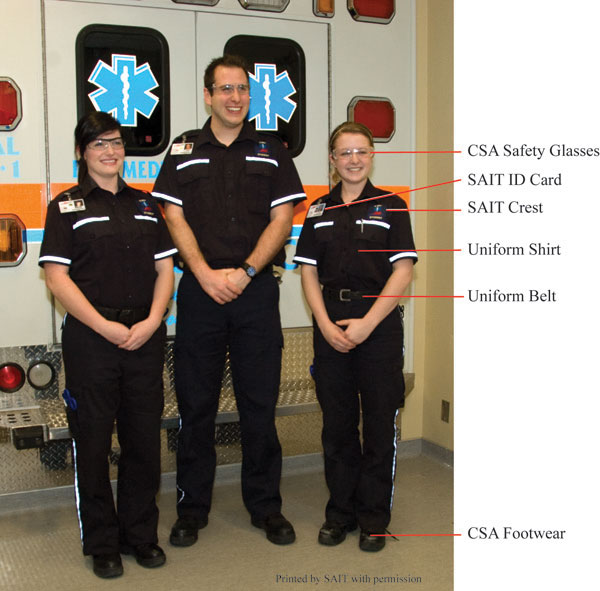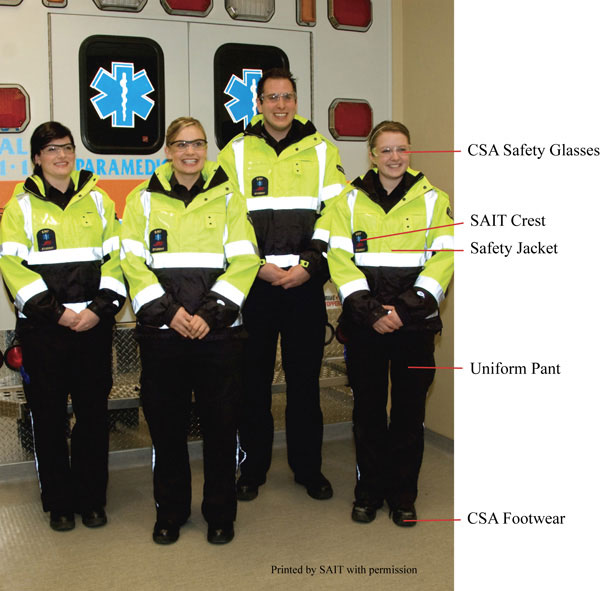Traits, skills and aptitudes
Paramedics tend to be innovative, methodical and objective.
You need:
- a strong desire to help those in need
- adaptability
- excellent communication skills
- attention to details
- sound decision-making and critical-thinking skills
- fine motor skills to provide advanced pre-hospital emergency care
- emotional self-regulation and the ability to remain calm, firm, reassuring and efficient in moments of crisis
- the ability to work alone and on a team
- a willingness to work extended hours and shifts, including nights and weekends
- to be comfortable with the sight of human blood and tissue
- to meet the job’s physical demands, including spending most working hours on your feet, repetitively bending, and assisting with transporting, lifting and positioning patients or equipment. Some of these requirements include:
- lift a stretcher with a 95.5 kg (210 lbs) patient with a partner from a lower level to the load position and back down
- lift and carry a long spine board with a 95.5 kg (210 lbs) patient and ascend and descend ten stairs with a partner
- push a stair chair 10 m with 95.5 kg (210 lbs) and ascend and descend 20 stairs with a partner
- bilateral side carry of 9 kg (20 lbs) of weight in each hand
- front carry 18 kg (40 lbs)
- perform CPR for two minutes.
All emergency medical personnel are required to wear personal protective equipment (PPE) for extended periods. This includes exposure to latex and other disinfectant materials.
You are strongly encouraged to refer to the ALIS website for career, learning, and employment information for emergency medical personnel, the Paramedic Association of Canada occupational competency profile and Alberta Health Service’s F.A.R.E. Paramedic requirements to ensure you can successfully meet the occupational requirements for the program and profession.
Practicum, co-op and work integrated learning opportunities
You’ll participate in required practicums under the guidance of experienced, on-site practitioners (preceptors) and SAIT instructors, who will mentor and oversee you in clinical settings.
You will be assigned practicum placements with consideration given to your preference of location. However, due to limited availability in Calgary, you might need to travel or relocate outside of the city or province.
The healthcare field has a strong focus on health, wellness, and fitness to practice due to the demanding nature of the work and Occupational Health and Safety requirements. As such, special considerations will not be granted based on individual circumstances or preferences, except those stated as protected grounds when an accommodation has been approved.
If you cannot obtain a tight facial seal while wearing a respiratory mask due to the presence of facial hair and refuse to shave for religious reasons, you will be considered unfit to work as a paramedic by Alberta Health Services (AHS) standards and will not be allowed to participate in practicum or successfully complete the program. Respiratory mask-fit testing is a requirement to participate in your practicum.
In compliance with the practica agreements with our clinical partners, you will be required to provide specific documentation before you can participate in your practicum. Find out what requirements you need for this program.
Accreditations, designations or certifications
This program is accredited by Accreditation Canada at the Advanced Care Paramedic level and meets the core competency requirements of the Alberta College of Paramedics.
Once you graduate, you’re eligible to write the Canadian Organization of Paramedic Regulators registry exam, and required to register with the Alberta College of Paramedics to work in Alberta.
You’ll also receive the following certifications as a graduate:
- Advanced Cardiovascular Life Support (ACLS)
- Pediatric Advanced Life Support (PALS)
- International Trauma Life Support (ITLS)
- Neonatal Resuscitation Program (NRP)
Credential
Upon successful completion of this program, you’ll be awarded a SAIT Advanced Care Paramedic diploma.
Accepts international applicants - PGWP-eligible
This program accepts international applicants and meets the eligibility criteria for the Post-Graduation Work Permit program, as long as the student is registered in on-campus classes or completes more than 50% of the courses on campus (for blended options).
International students attending all classes online will NOT be eligible for a Post-Graduate Work Permit. International students are responsible for maintaining their eligibility throughout their studies.
Related careers
Our graduates may work in the following occupations. Some careers require additional experience and education.
Potential careers (NOC):
- Paramedical occupations (32102)
- Managers in healthcare (30010)
- Health policy researchers, consultants and program officers (41404)
Admission requirements - Applicants educated in Canada
All applicants must demonstrate English language proficiency and completion of the following courses or equivalents:
Program outline
The Advanced Care Paramedic diploma requires 60 credits (23 courses) to complete.
The program spans two years, with three semesters in year one, and two semesters in year two.
This program’s September intake is primarily delivered on campus, while the January intake is blended, with theory courses completed primarily online and labs on campus. Both delivery modes offer the same curriculum and require full-time study.
Suggested schedule of study
Progression
You must attain a PGPA and/or a CGPA of 2.0 or better each semester and pass the prerequisite courses to progress through the program.
To qualify for graduation, you must pass all courses, attain a CGPA of 2.0 or better and complete course requirements within the prescribed timelines.
Review our grading and progression procedure >
Books and supplies
Books, uniforms and supplies are approximately $5,500 per full-time year.
This is a bring-your-own-device program with a standard computer hardware and software requirement. See the specific requirements on our computers and laptops page. An Apple tablet is recommended, as it is required to support certain applications used in the program, and will support all portable computing device requirements of the program.
Find your booklist on the SAIT Bookstore’s website. Booklists are by semester and made available approximately two weeks before classes begin.
Required personal protective equipment (PPE) and uniform
Uniforms and PPE are to be purchased before orientation day.
Print and take the uniform order form to Trademark Workwear Inc. to order your SAIT uniforms. Refer to the form for details and ensure you order your uniform early.
CSA-approved safety glasses and black steel-toed duty boots may be purchased where available.


Ballistic vests
The SAIT paramedic programs do not require ballistic vests.
Many practitioners can be issued a ballistic vest by their employer as PPE. This is an employee’s decision if they want the ballistic vest or not.
As a best practice for scene safety, police deem the situation safe before EMS crews enter, and our students are not first in any situation where this type of PPE is required.
If you wish to purchase your own ballistic vest for use on practicum, you can do so through the AHS-approved vendor Urban Tactical, Winnipeg, which has the required minimum specifications for a ballistic vest.
If you decide to purchase and wear the vest, you must ensure that your SAIT crest and student identification are clearly visible on the vest without compromising the integrity of the vest.
If you have a ballistic vest from an employer, you are not allowed to wear that employer’s issue as part of the SAIT uniform.
If you choose to wear a ballistic vest during your program, you must purchase a personal ballistic vest.
Ballistic vests are personally fitted, have a limited lifespan, and are not resalable as they do not provide the appropriate protection second-hand. If you choose to wear a personal ballistic vest, you must wear it for every call during your practicum rotations.
Additional fees
- A fee of $75 per semester is associated with the CompTracker application used in this program.
- A fee is associated with obtaining a police information check, including a vulnerable sector check, payable to the police or the Royal Canadian Mounted Police (RCMP).
- You must have your immunizations reviewed by the SAIT Health Clinic. There is a $75 charge to review vaccine history. Any vaccines you need to be administered will result in additional charges.
- A fee of approximately $50 to $100 is associated with an electronic student permit checking submission, which is required for clinical practicum placements, payable to Synergy Gateway through the Verified software platform.
- You are responsible for additional expenses related to your practicum, including pre-practicum requirements and relocation costs to practicum sites outside of Calgary.
- There is a fee for the Alberta College of Paramedics (ACP) provincial exam and a registration fee of $475. Annual renewal fees are approximately $425.
- A Class 4 Driver’s license may be required for employment. We recommend you review the Alberta government information for requirements and begin the process while in the program.
Health and Public Safety program advising
For any questions or to set up an advising appointment, please contact our School of Health and Public Safety.
Phone: 403.284.8481
Email: hps.info@sait.ca
Program outcomes
This program addresses the entry-level competencies identified by the Canadian Organization of Paramedic Regulators (COPR), and is cross-referenced to the current Canadian Paramedic Competence Framework (CPCF).
Graduates will be capable of demonstrating the following at the level of an Advanced Care Paramedic:
- Demonstrate professionalism, legal and ethical behaviour, and teamwork within the work environment.
- Perform effective oral and written communication specific to the work environment.
- Perform health and safe work-practices within the work environment.
- Perform effective patient assessment and diagnostic practices relevant to patient care.
- Provide safe and effective therapeutic interventions to patients in accordance with the Advanced Care Paramedic scope of practice.
- Integrate assessment, diagnostic, and therapeutic practices during patient care.
- Prepare patients for safe ground and air transport.
- Perform safe road ambulance operation and continuous vehicle maintenance.
- Promote health and public safety.